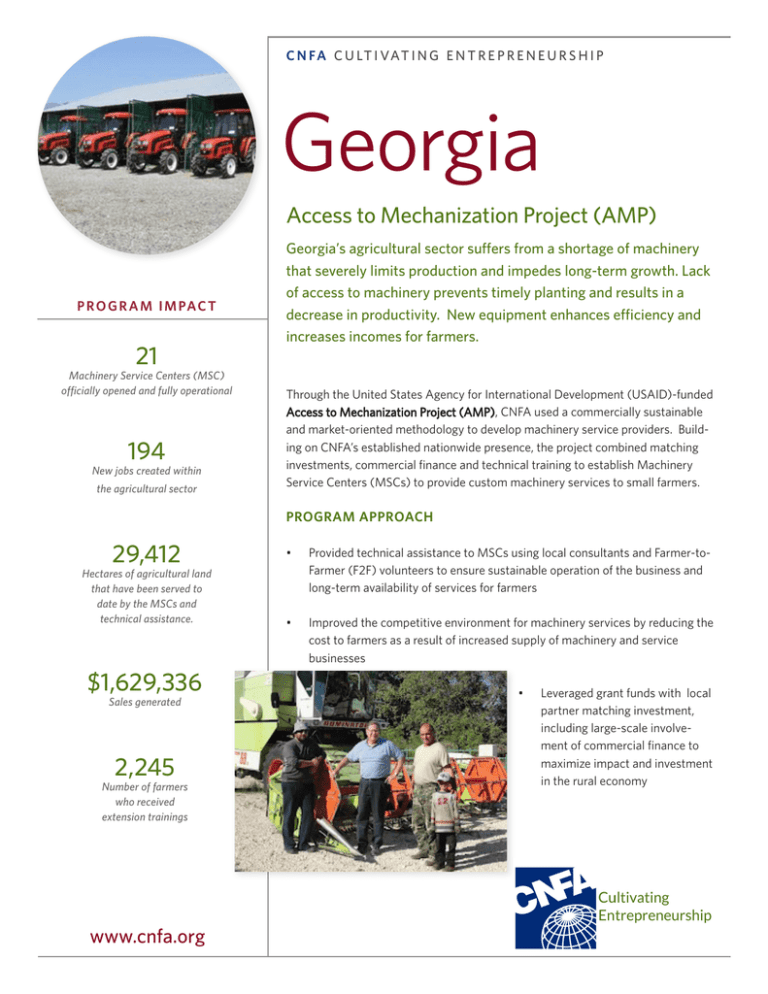CNFA Georgia Access to Mechanization Project Fact Sheet
advertisement

C N FA C U LT I VAT I N G E N T R E P R E N E U R S H I P Georgia Access to Mechanization Project (AMP) P R O G R A M I M PAC T 21 Machinery Service Centers (MSC) officially opened and fully operational 194 New jobs created within the agricultural sector Georgia’s agricultural sector suffers from a shortage of machinery that severely limits production and impedes long-term growth. Lack of access to machinery prevents timely planting and results in a decrease in productivity. New equipment enhances efficiency and increases incomes for farmers. Through the United States Agency for International Development (USAID)-funded Access to Mechanization Project (AMP), CNFA used a commercially sustainable and market-oriented methodology to develop machinery service providers. Building on CNFA’s established nationwide presence, the project combined matching investments, commercial finance and technical training to establish Machinery Service Centers (MSCs) to provide custom machinery services to small farmers. PROGRAM APPROACH 29,412 Hectares of agricultural land that have been served to date by the MSCs and technical assistance. $1,629,336 Sales generated 2,245 Number of farmers who received extension trainings www.cnfa.org • Provided technical assistance to MSCs using local consultants and Farmer-toFarmer (F2F) volunteers to ensure sustainable operation of the business and long-term availability of services for farmers • Improved the competitive environment for machinery services by reducing the cost to farmers as a result of increased supply of machinery and service businesses • Leveraged grant funds with local partner matching investment, including large-scale involvement of commercial finance to maximize impact and investment in the rural economy Georgia Access to Mechanization Project (AMP) F2F Volunteer Engagement in Georgia AMP Support from the Farmer-to-Farmer (F2F) volunteers was a critical and integral part of AMP implementation. A total of 25 volunteer assignments, focused primarily on conducting various types of trainings, were implemented over the life of the program. Business Management Training Sessions: F2F volunteers conducted a wide array of trainings on business management. After meeting with potential training recipients, the volunteers planned the full-scale training designing. The volunteers, with the assistance of the AMP Training Coordinator, selected local trainers, finalized business and extension training topics, and developed standardized training materials. Financial and Credit Trainings: Basic financial trainings for AMP’s farmers were led by F2F volunteers on the topics of credit lending, record-keeping and risk assessment. The trainings were particularly useful in assisting the farmer clients with understanding their budgets and recognizing when they could rent equipment from MSCs. Technical trainings delivered by volunteers work with the staff of the agricultural TV show “Farmer’s Day.” Environment Trainings: AMP organized volunteer-led trainings focusing on environmentally-friendly agricultural practices for MSC owners and trainers of a local extension training provider consortium. These trainings were conducted on irrigation and drainage systems, pest and disease control, technologies of land cultivation, and agricultural mechanization. Marketing and Communications Support: CNFA fielded volunteers to help develop communications and marketing strategies for MSC owners to demonstrate a comprehensive picture of what service types they should offer. Additionally, volunteers worked with the Georgian Public Broadcaster in designing the format of the Agricultural TV show “Farmer’s Day” and created a full-scale business plan to facilitate the funding of the show. CNFA, based in Washington, D.C., stimulates economic growth and improves rural livelihoods by empowering the private sector. CNFA’s unique approach is founded on six core capacities: 1) commercial input supply and farm services; 2) economic resilience and rapid recovery; 3) agricultural productivity, food security and nutrition; 4) value chain development; 5) volunteer technical assistance and 6) access to finance. CNFA has worked in over 38 countries worldwide and impacted the lives of more than 70 million people. For more information, visit www.cnfa.org. www.cnfa.org C N FA C U LT I VAT I N G E N T R E P R E N E U R S H I P
